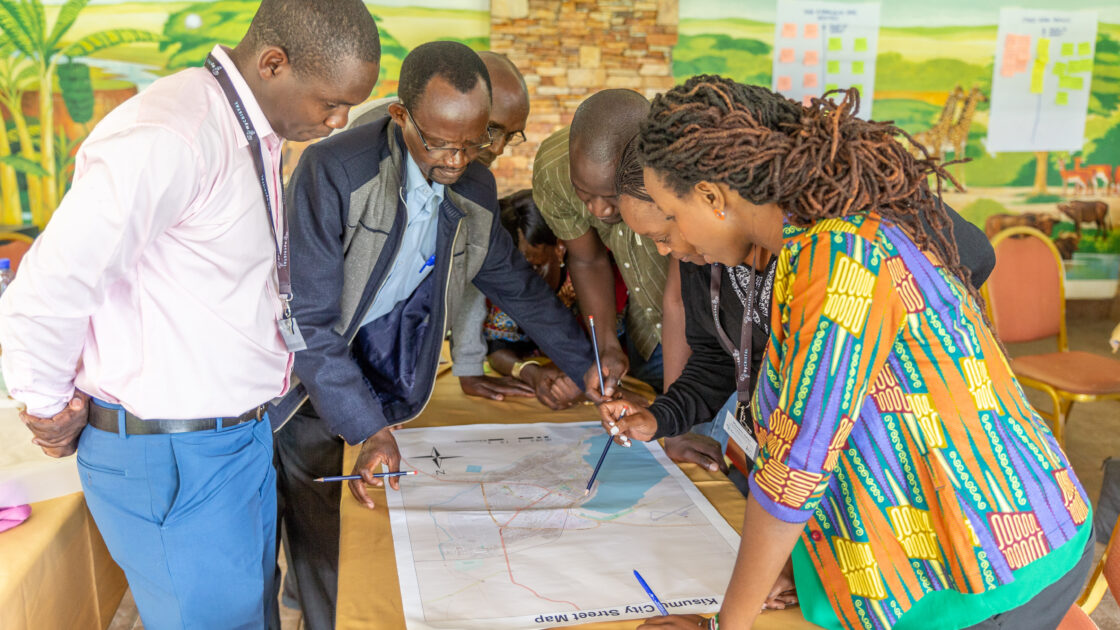by Anpotowin Jensen, Oglala Lakota Nation Embarking on the journey to the UN Environment Assembly Conference in Nairobi, Kenya, I felt a…
Co-producing climate information for Africa
 HyCRISTAL project partners discuss urban flood risks in Kisumu, Kenya, during an annual meeting. Credit: Julio Araujo, CC BY 2.0
HyCRISTAL project partners discuss urban flood risks in Kisumu, Kenya, during an annual meeting. Credit: Julio Araujo, CC BY 2.0This overview of the Future Climate For Africa programme was written for Latitude by Roy Bouwer of SouthSouthNorth
Africa is one of the regions most at risk to the effects of climate change. The climate of the continent has already changed, with extremes happening more often and with greater intensity. Countries across the continent need to integrate accurate and relevant climate information into decision-making to safeguard the lives and livelihoods of people and communities. However, one of the key barriers to mainstreaming climate change in decision-making is the poor scientific understanding of Africa’s climate, which results in large uncertainty in future changes. The Future Climate For Africa (FCFA) programme aimed to address this through delivering a substantive improvement in generation and use of climate information in policy, planning and investments.
FCFA was a research and development programme funded jointly by the UK Foreign, Commonwealth and Development Office (FCDO) and the Natural Environment Research Council (NERC). The shared focus on the fundamental climate science and addressing real-world problems meant the programme was able to generate meaningful impact. The programme worked in a particularly collaborative manner, which meant expertise and technical capacities could be shared to tackle problems. This also allowed for rapid scientific progress as expertise was shared across the continent, and emerging findings could be leveraged by other researchers to further their own research.
Within the climate science field, FCFA was able to improve the fundamental understanding of key drivers of Africa’s climate. Some important outcomes of this were the enhanced understanding of East Africa’s climate (including variability in the long and short rains and the East Africa Climate Paradox), understanding changes in megastorms in West Africa, and understanding the connections between central and southern Africa’s climate. Exploring these key processes that have a role in driving regional climates provided crucial insights into understanding how climate is changing or will change in the future, and the risks associated with this.
Another core element of FCFA’s climate science work was focused on model development. New knowledge from FCFA research has been integrated into global climate models, and a new convection permitting model was developed specifically for Africa – CP4-Africa. The high resolution CP4-Africa model is able to better simulate convection systems (such as thunderstorms) on a finer scale than was previously possible with global models. This has provided new insight into future climate extremes over Africa, indicating extreme rainfall and dry spells may become more frequent than previously suggested by global models.
Deepening the understanding of Africa’s climate has laid the groundwork for providing accurate and relevant information to inform long term decision-making. In order to address real-world problems across the continent, FCFA’s regional research consortia adopted novel approaches to engagement within a range of pilot studies focused on context-specific development issues. Key to engagement within these pilot studies was co-production, which aimed to connect scientists with decision-makers to identify and deliver decision-relevant and demand-driven climate information.
Adopting a co-production approach helped develop the capacity of researchers to produce decision-relevant information, while generating buy-in and co-ownership of the information and developing the capacity of decision-makers to use the information. One example of this is demonstrated by the CI4-Tea project which worked with tea farmers in Kenya and Malawi to co-identify relevant climate metrics for tea production. This allowed climate scientists to produce locally relevant projections of temperature extremes, identified by tea producers as a key concern, to inform relevant adaptation options in the sector.
Working closely with decision-makers to develop relevant information also helped scientists understand how to package and communicate climate risks. Climate risk narratives were developed to combine high-level climate messages with local development data to outline 2-3 possible future scenarios. Climate Risk Narratives were produced for cities in Southern Africa, as well as rural and urban settings in East Africa. These narratives acted as useful tools to guide engagement around future climate risks to support robust decision-making in the water and sanitation sectors.
FCFA has demonstrated the value in investments in both climate research as well as co-production of climate information. Through improved scientific understanding and novel approaches of engagement to influence real world problems the programme was able to: influence 13 policies, plans and investments; deliver 14 tools to support decision-making; and directly engage with 187 institutions. However in order to have the intended long-term impacts, sustained efforts are needed to ensure the continuation of FCFA’s work. Going forward, it is important to find ways to scale-up and replicate the approaches adopted within FCFA to ensure effective adaptation to climate change.